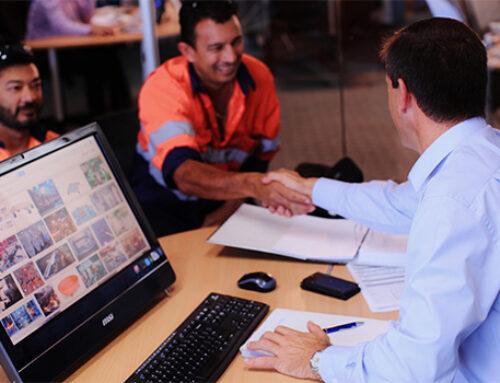Whether you’re leading a group of permanent employees, contract workers, temporary staff, or a combination of the three; how well you do it will determine whether you achieve your organisation’s goals or not. Making sure a group of people works cohesively towards a common goal is, however, easier said than done and can easily become overwhelming.
What is leadership?
Before we get to how you can become a good leader, let us first try to understand what leadership is. A leader is defined as a person who establishes a clear vision for his/her team and then proceeds to guide the team towards their vision by empowering them and coaching them to greatness. A leader needs to stay calm and collected in crisis while maintaining a laser-focus on the end goal.
The thing you need to keep in mind when working to be a good leader is that leadership is not a popularity contest. People do not have to like you to respect you. Leadership is about influencing others irrespective of their job titles in order to achieve a certain goal. And more than anything else, leadership is about bringing harmony to the workplace so that people want to work together.
Tips for becoming a good leader
So what does it take to become a good leader? While great leaders do have some intrinsic qualities that can be hard to develop, it’s possible to transform yourself from an average to a great leader if you are willing to face the challenges and keep working to improve. Here are some guidelines to get you started on the right path to becoming the kind of leader your business needs to succeed.
1. Build trust.
To effectively lead a team, you will need to be willing to go out on a limb for your team members to show that you’ve got their back. By exhibiting a genuine interest in the well-being of your team, it shows them that you care and are willing to defend them when necessary. When your team trusts you, they know that your actions and interests will never supersede the goals and well-being of the organisation and its employees. You can also build trust by:
- Participating in the day-to-day activities of the organisation whenever you can and availing yourself for questions.
- Making an effort to learn a bit about each one of your team members.
- Being fair and consistent in your actions so that your employees can anticipate consequences and rewards based on your previous actions.
- Involving employees in important decisions as this shows them you value their input.
- Recognising the contributions of your employees and praising them instead of taking all the credit for results.
2. Promote and encourage open two-way communication
Strive to create an environment where your employees feel safe to exchange candid, honest and direct feedback without being afraid of negative repercussions. For communication to be effective, it needs to be two sided where you give and receive feedback. Make sure you provide ample channels to facilitate two-way communication between you and your employees and solicit and reward their ideas and contributions. You can facilitate open communication by:
- Encouraging your employees to come to you with questions, discuss their concerns and suggest solutions for problems. You should also allow your team members to express their true opinions on company policies and decisions.
- Highlight examples of contributions by employees that helped the company progress towards its goals.
- Listen to and respect the opinions of others regardless of their job title.
In the spirit of open communication, you should also strive to ensure that your employees are provided with accurate, up-to-date information about the organisation’s goals, successes and failures. Change, whether good or bad, should also be communicated to your employees with adequate information on why it’s happening. Use newsletters, team meetings or the company’s intranet to get the information directly to everyone.
3. Be a coach
In addition to painting a vision that inspires your team to work hard, you will also need to continuously motivate, energise and show confidence in the capabilities of your team. Additionally, you need to provide continuous coaching to your team members to ensure that they are competent at what they do and can perform as you expect them to.
Keep in mind that coaching should not be done on a group level, it needs to be personalised in order to be effective. Each and every team member is unique, and you need to keep this in mind when you’re coaching them. You will, therefore, need to come up with different coaching methods for each team member. And while being fair is one of the pillars of being a good leader, it doesn’t mean you treat everyone the same.
4. Demonstrate confidence in your decisions
To be a good and effective leader, you need to be comfortable making major decisions and sticking to them even when faced with a lot of opposition. Don’t be afraid to make tough calls and be decisive when circumstances require you to be.
To ensure your decisions are always as good as they can be, make sure you have an in-depth understanding of the issue by acquiring as much information as you can about it. It’s easier to stand by your decisions if you know that they were made based on information and facts.
5. Take responsibility
If you do happen to make a mistake- which is bound to happen from time to time- you need to be able to own up to it and be receptive to feedback and change. Running a business involves taking a lot of risks that do not always pan out. And when things don’t go as expected, be ready to stand up for your team members and their decisions. This will motivate your employees to keep taking risks which will eventually pay out.
More importantly, do not blame other people for the circumstance or situation when the mistake is yours. People like to follow honest leaders, so be credible. Talk openly about the mistake, learn from it and move on. Your team will trust you more for being honest.
6. Leverage your team
Being a leader does not mean you need to make every decision or oversee everything your team is doing. It’s essential that you learn to leverage your team member’s strengths to get things done. Find out the strengths of each individual in your team and make use of their expertise. Allow them to lead projects that they are passionate about and empower them to succeed by removing roadblocks, and support their endeavour by providing whatever they need to get the job done. An important aspect of being a great leader is realising that you cannot do everything by yourself and that you can achieve more by delegating.
By following this guideline, you will be able to transform your leadership capabilities from average to great for your benefit, that of your organisation, as well as your employees’.






